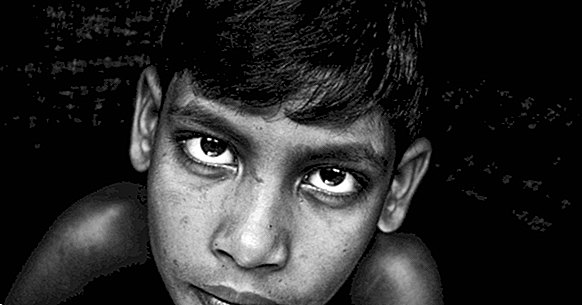Psychological reactivity: what is it?
The human being is fundamentally a social animal, and that makes him adapt his behavior depending on the social context in which he finds himself. But the social character of our species is very different from that of other forms of life .
Just as social insects like ants can live in large colonies, they are not aware of this: they lack the ability to imagine the concept of the "other" and "oneself". We, on the other hand, are social not only because we live collectively, but also because we think about the mental states of others. This, however, has a side effect called psychological reactivity .
What is psychological reactivity?
In psychology, reactivity is a concept that serves to designate the tendency of individuals to modify their behavior when they feel that someone is watching them . The presence or absence of psychological reactivity makes us behave in one way or another, be alone or accompanied. In fact, reactivity may not exist in contexts in which we are surrounded by many people, precisely because the fact of being in a busy place can make us think that nobody is going to notice us. What matters is the fact of being aware that someone is watching us, not so much our physical proximity to other people who might see us.
So that, it is possible that psychological reactivity appears at times when we are alone , if we come to believe that there are disembodied entities that look at us, something typical of magical thinking. But neither is it necessary for this belief to be very firm; the simple act of evoking a person we want to make a good impression on can make us, without realizing it, behave somewhat more like we would if that person were really watching us.
It is this phenomenon that makes, for example, Social Psychology not only study the influence that others have on the person, but also the influence they have on these imaginary entities that are perceived as real or partially real in the here and now .
That is why psychological reactivity is a complex phenomenon , which depends as much on how we perceive our environment as on cognitive elements and our imagination. Therefore, it is difficult to control and study, since the imagination has a role in it, and it can not be modified in a predictable way from the outside of the individual.
In addition, reactivity always contains a scale of intensity: changing our behavior by remembering a teacher to whom we owe a lot is not the same as doing it when we know that thousands of people are watching us through a television camera. In the second case, the influence of others will be much more noticeable, and will have an impact on practically all our gestures.
Psychological reactivity in research
But if the concept of psychological reactivity serves any purpose, it is for Take it into account in research based on the observation of individuals .
One of the principles of science is the objective of studying natural processes without intervening in them, but psychological reactivity involves strong interference where behavior researchers try to learn about the behavior of humans or other animals with developed nervous systems. : its mere presence makes individuals behave differently than they would if they were not being subjects of scientific study, and in this way the results obtained are contaminated .
In Psychology, as in any science, it is essential to know well define the type of phenomena that are being studied, ie, isolate the variables to look at what you want to investigate, and psychological reactivity can produce results that are not representative of those mental or social processes that we are trying to know better.
This means that the presence of psychological reactivity in scientific research poses a threat to its internal validity , that is, in the face of their ability to find findings related to the object of study that they wanted to investigate, and not with anything else. For example, if a research is intended to analyze the behavior patterns of a specific ethnic group when making purchasing decisions, the results obtained could actually reflect the way in which members of this group want to be seen by Westerners , without the researchers noticing it.
The Hawthorne effect
The Hawthorne effect is a type of psychological reactivity that occurs when subjects who participate in an investigation know that they are being observed.
It's the kind of psychological reactivity typical of behavioral research , and presents different variants, such as the John Henry effect, which occurs when a group of subjects modify their behavior when imagining that they are part of the control group of an experiment, or the Pygmalion effect, in which the volunteers of a research adapt their behavior voluntarily or involuntarily so that the main hypothesis defended by the experimenters is confirmed. This phenomenon is usually preceded by the experimenting effect, which occurs when the researchers themselves give clues about what their intentions are and what results they hope to obtain.
How to avoid psychological reactivity in research?
Normally, psychological reactivity is controlled by making people who participate in a study know the least about it. In social psychology, for example, it is common to hide almost all the information about the purpose of studies, and sometimes lies, as long as this does not go against the integrity and dignity of people, and clarifying what is the experiment after having made the observations.
Double-blind studies are part of those that are better designed to prevent the onset of psychological reactivity , since in them neither the subjects that are being studied nor those that perform the "raw" data collection about the previous ones know what is the objective of the investigation, thus avoiding the Pygmalion and experimental effects.



















